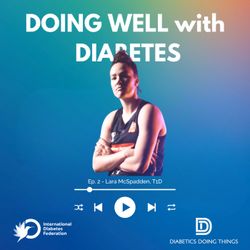Share

D-Talk
Basic and Translational Science
Season 1, Ep. 12
•
Join host Phyllisa Deroze as she delves into the world of basic and translational science — two powerful forces reshaping the landscape of diabetes management and care — with Prof Michael Roden, a leading expert in the field and lead of the Basic and Translational Science stream at the IDF World Diabetes Congress in Bangkok. From "lab to life," discover how research is expanding our understanding of diabetes subtypes and energy metabolism while paving the way for personalised treatments.
More episodes
View all episodes

3. Doing Well with Diabetes: Gary Hall Jr.'s Journey with Diabetes
52:47||Season 1, Ep. 3In this third episode of a special podcast series in partnership with Diabetics Doing Things, host Rob Howe interviews Gary Hall Jr., the most decorated Olympian with type 1 diabetes. Gary shares his experiences leading up to and following his diagnosis in 1999, discussing the challenges and triumphs of managing diabetes as a top-level athlete. They delve into the nuances of diabetes management, the importance of perseverance, and the critical support systems that aided Gary in his career. The conversation also addresses broader topics such as advocacy, the role of sports in diabetes management, and the future of diabetes care. Doing Well with Diabetes is part of Kids and Diabetes in Schools, an IDF programme supported by Sanofi and ISPAD.
16. Using real-world evidence to tackle the global burden of diabetes and cardiovascular disease
17:34||Season 1, Ep. 16Diabetes and cardiovascular disease, or CVD, are a global public health burden. People living with diabetes are up to four times more likely than the general population to develop cardiovascular complications such as heart attack and stroke. In this episode of D-Talk, host Phyllisa Deroze welcomes Professor Kamlesh Khunti to explore how registries are invaluable for managing and understanding diabetes and cardiovascular disease.
2. Doing Well with Diabetes: Balancing Professional Basketball and Diabetes Management
43:13||Season 1, Ep. 2Doing Well with Diabetes is part of the Kids and Diabetes in Schools program from the International Diabetes Federation and is supported by Sanofi and ISPAD. Diabetics Doing Things has donated all production and promotion in kind. To learn more about the Kids program, visit kids.idf.org. And to hear more from Diabetics Doing Things, visit diabeticsdoingthings.com/subscribe.In this episode of Doing Well with Diabetes, host Rob Howe interviews professional basketball player Lara McSpadden. Lara shares her experiences of living with diabetes for nearly 18 years and how it intersects with her career as an athlete. They discuss the challenges of managing diabetes while maintaining a rigorous training and playing schedule, the importance of a strong support system, and mental health. Lara also provides insights into her routines, favorite diabetes management tips, and advice for young athletes with diabetes. This inspiring conversation aims to encourage those living with diabetes to pursue their dreams while effectively managing their condition.
1. Doing Well with Diabetes: Perfection is a Myth
35:29||Season 1, Ep. 1Doing Well with Diabetes is part of the Kids and Diabetes in Schools program from the International Diabetes Federation and is supported by Sanofi and ISPAD. Diabetics Doing Things has donated all production and promotion in kind. To learn more about the Kids program, visit kids.idf.org. And to hear more from Diabetics Doing Things, visit diabeticsdoingthings.com/subscribe.In this episode of Doing Well with Diabetes, host Rob Howe interviews Steffi Radcliffe, an Olympic hammer thrower living with type 1 diabetes who was recently part of Australia’s 2024 Olympic Team. Steffi shares her journey of managing diabetes while excelling in athletics and academics, including her experiences at the University of Georgia and Harvard University. Stephanie and Rob discuss the unrealistic expectation of maintaining perfect blood sugar levels for people with type 1 diabetes. They highlight the dangers of striving for perfection, likening it to general life pressures that can bring about stress and negativity. They emphasize the importance of managing diabetes to the best of one's ability without demanding perfection. Stephanie also discusses the challenges and strategies for managing diabetes in high-pressure situations, the importance of a positive mindset, and her hopes of inspiring the next generation of athletes with diabetes. The episode highlights Steffi's growth in embracing her diabetes identity and connecting with the type 1 community.
15. Diabetes and Well-being
42:36||Season 1, Ep. 15What's the connection between mental well-being and diabetes management? In this episode of D-Talk dedicated to the World Diabetes Day theme: Diabetes and well-being, host Phyllisa Deroze is joined by three inspirational diabetes advocates, Thapi Semenya, Naser Altooblani and Bruno Helman. They explore how untreated mental health issues can worsen diabetes outcomes and how the pressures of diabetes management can affect mental well-being.
14. Diabetes and pregnancy
01:04:23||Season 1, Ep. 14Did you know that approximately one in six pregnancies worldwide is affected by hyperglycaemia? That's a staggering 21 million women!Pregnancy can be an exciting time, but it can also present challenges, especially for expectant mothers with diabetes. In this episode of D-Talk, Professors Helena Backman and David Simmons join host Phyllisa Deroze to explore screening and treatment options available for diabetes during pregnancy, potential complications for both mother and baby, postpartum care and the importance of managing diabetes for future pregnancies.
13. How Real-World Evidence can help tackle the global burden of diabetes and chronic kidney disease
36:37||Season 1, Ep. 13Data from the IDF Diabetes Atlas Report on diabetes and kidney disease released in 2023, indicate that approximately 30 to 40% of people living with diabetes develop CKD. Furthermore, over the last 20 years, CKD due to type 2 diabetes has increased worldwide by about 74%. In this episode of D-Talk, host Phyllisa Deroze welcomes Professors Mustafa Arici and Ruben Silva Tinoco to explore how the iCaReMe registry can bridge gaps in early diagnosis and prevent diabetes-related kidney complications.
11. Diabetic Retinopathy: a call for global action
42:44||Season 1, Ep. 11In this episode of D-Talk, Dr. Covadonga Bascaran and Professor Sehnaz Karadeniz join host Phyllisa Deroze to discuss a common diabetes-related complication: diabetic retinopathy (DR). DR can develop in anyone living with type 1 or type 2 diabetes and other types of diabetes, such as LADA. In 2020, an estimated 103 million adults had diabetic retinopathy (DR), and over 47 million had vision-threatening retinopathy requiring prompt treatment to preserve vision.